L to R: Directors Annie St-Pierre and Marianne Farley seat down to discuss FRIMAS & LES GRANDES CLAQUES (Like the Ones I Used to Know)
Directors Annie St-Pierre and Marianne Farley sit down together for a discussion about their films. Annie St-Pierre wrote and directed Les Grandes Claques (watch trailer below). While Academy Award® Nominee Marianne Farley is the director of FRIMAS (watch trailer below). Both directors courtesy of h264 an integrated distribution studio supporting filmmakers put out this interview which is directed by Rolly Assal. Both female directors contribute tremendously to the craft of directing and filmmaking. As an emerging filmmaker, you discover answers to their 8 questions about their visions, inspirations, and insights on their experiences writing and shooting Les Grandes Claques and Frimas.
Watch the Official Trailer for Les Grandes Claques directed by Annie St-Pierre
Watch the Official Trailer for FRIMAS directed by Marianne Farley
Question No. 1 – What are you most proud of about FRIMAS?
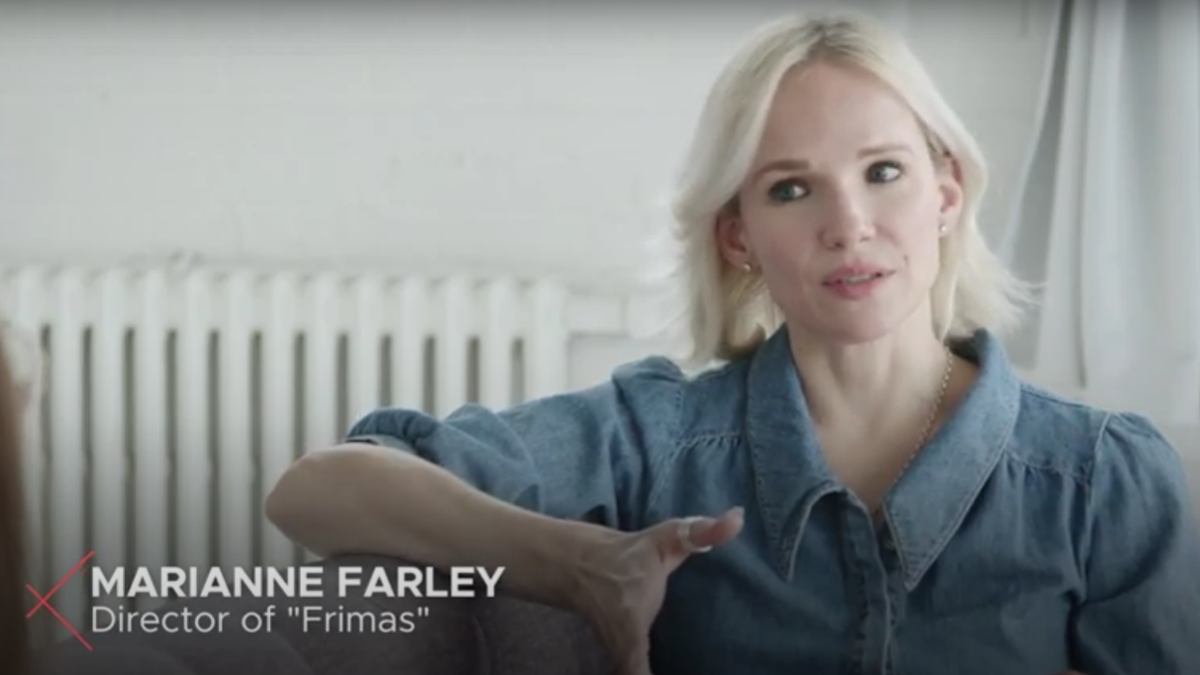
Marianne Farley: That’s a good one. (It’s a good one! Echo’s Annie). I think you know the subject matter definitely, that we’re talking about women’s rights. That this film (FRIMAS) is meant to protect these rights. And you know spark conversations about this stuff. I think I’m really proud of the fact that people get that when they watch it. That it’s troubling. It’s moving. Yes! It is powerful. I think, (yeah) who here is comfortable with?
And, it’s very different from Marguerite (my previous film). Where it was the complete opposite. With Marguerite, it was like people were moved. And, you know it’s a very soft film. It is a very sweet film. Whereas FRIMAS is tough. It’s a tough film. And it’s definitely not easy, so, but that’s what I set out to do.
Question No. 2 – If your short had to be screened before a feature film, which film would it be and why?
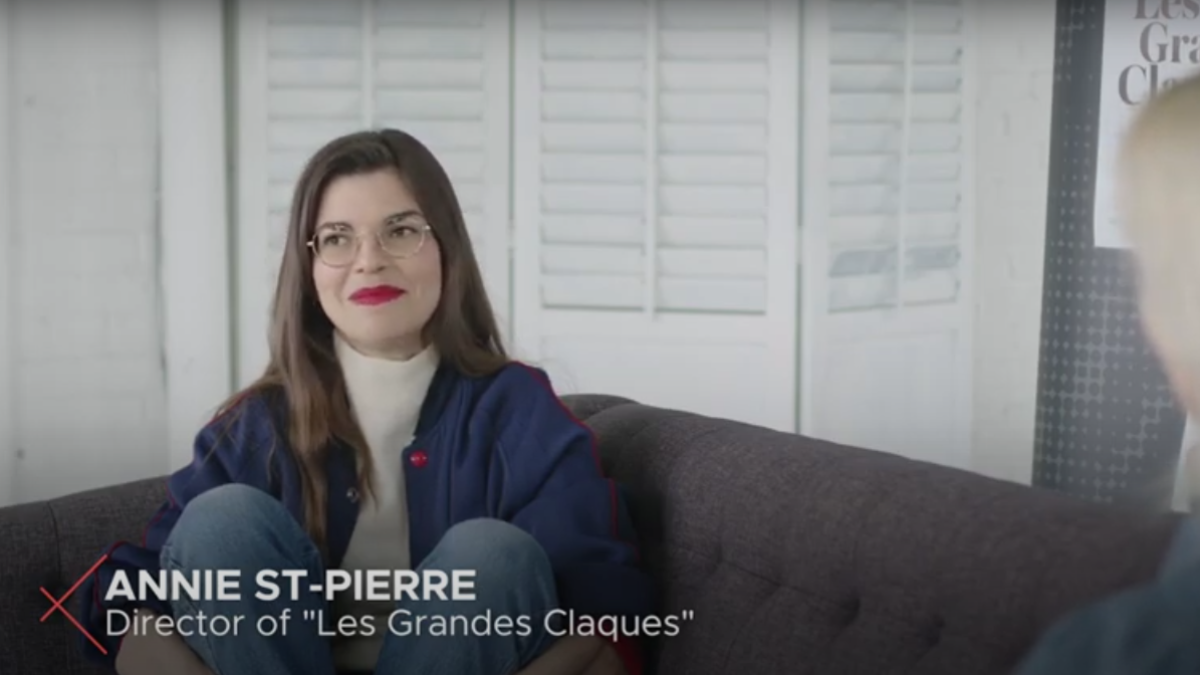
Annie St-Pierre: That’s a good question. Yeah. I’m not sure I’ll be able to answer this quickly. But, I do think that curation (at film festivals) is something so challenging to do. I find it most interesting when a film gives more insight into the next one.
I love when curators or programmers (at film festivals) are finding some films to put together that maybe, talk about the same subject. But, they do so from another angle. So, maybe Marriage Story. Marriage Story (2019), a drama film written and directed by Noah Baumbach. Marriage story will be my choice of a feature film that will screen before my short film, “Les Grandes Claques”. Because it’s kind of the same subject as Marriage Story. It’s about divorce and a broken family. But, it is told from an adult angle, and more like the end of a love story. Also, you’re following the story of the father, but there’s still a kid there.
But it’s not like the film is not told in the eyes of the kids. I think like the ones, I used to know. We sure have both; we have the father and the daughter. But, I think that we people identify ourselves through the little girls. Yeah, more to the little girls I think.
it’s a great film yeah it’s a great film it’s a really beautiful film I think that would work actually yeah maybe we should call it can we can you can the film come out again can we put like Legrand clack before for them okay
Question No. 3 – Why did you choose to set your film in the near future?
The Official Trailer for L’événement (Happening) Directed by Audrey Diwan
Marianne Farley: The reason I decided to put the story into the future is really that (you know) I wanted to tell women that this is not just something that’s in her past, but it’s also something that could eventually come to be again.
So I didn’t want people to say thank God we’re past that because I don’t believe that we are, unfortunately. So that’s why for me it was really important to set it into the future. And then there’s L’événement. L’événement (English: Happening) is a 2021 French drama thriller film directed by Audrey Diwan. L’événement came out (the french film that won at Venice Film Festival) and that one’s set in the 1960s or 70s. And you know one of my favorite films is 4 Months, 3 Weeks and 2 Days. It’s a brilliant film and I didn’t want FRIMA to be like the short version of that. So, that’s why for me it was really important to make a different film. I wanted prima to have its own statement which is like a call to action. We have to really protect our rights it’s happening, unfortunately.
Annie St-Pierre: It works really well. it’s a brilliant idea.
Question No. 4 – Who are your biggest inspirations in film directing?
The Complete Films of AGNÈS VARDA Trailer
Annie St-Pierre: I get all the questions about name-dropping.
Marianne Farley: “Who are you most inspired by?” Yeah, that’s difficult?
Annie St-Pierre: No, it’s not. It’s certainly not just one person. Yeah, I would say, Agnès Varda (A french director whose film, “La Pointe Courte” (1954) was a precursor to the 1960s French New Wave movies). I think because it’s not only her work, it’s really her process. Also, I find that she did a lot just to erase borders in cinema. She erased borders between documentary and fiction film, and borders between her subject too. I find that really inspiring. I think that during her life, she was more about films than her career. It all just talked to me. It’s also because I began in documentaries, so I was so inspired by her when I was 20 years old, and not thinking about doing fiction in my life at that time.
Then things changed a little for me and then I was like Oh no. But, I want to do this sort of thing and it’s not possible in documentary filmmaking. I can’t control my language as well as if I have the possibility just to say hey stop. Do it again. But I was still able to find things to inspire me in her work. So, she is my brain sister.
Marianne Farley: Your brain sister. Oh, I like that.
Question No. 5 – What were your biggest challenges shooting Frimas?
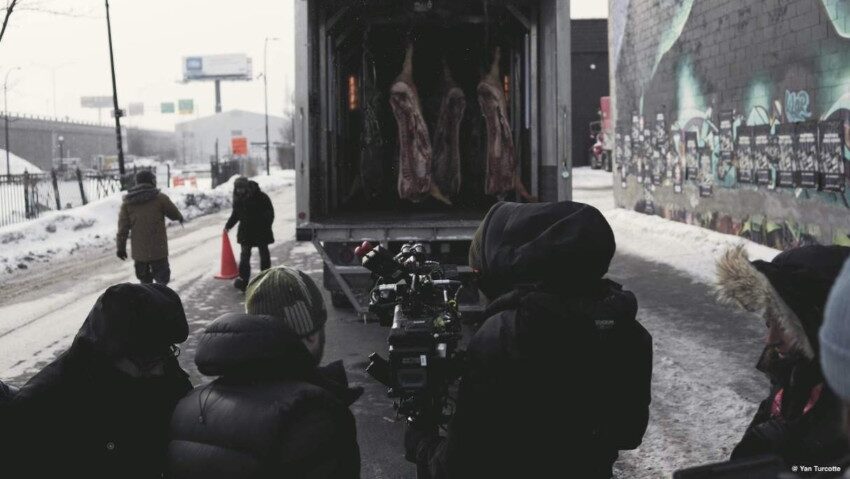
Marianne Farley: I get asked this a lot. Well, you know we shot FRIMAS outside. You (referring to Annie St-Pierre) shot Les Grandes Claques outside
Annie St-Pierre: Yes, during winter.
Marianne Farley: Yeah, during winter, and was like -25, that was definitely a challenge. I think for me the biggest challenge was when you write something and it really works in your mind, you think when you’re shooting it using a moving truck that it’s going to be fine. There’s the assumption, that we’ll figure it out, and then you go to shoot, and you really have to figure it out. So that whole thing where you know we had to find the meat and make sure it wasn’t going to spoil. That we were going to be able to give it to people to actually feed people because that was really important to us. That was a challenge.
The whole truck is moving (rocking, swaying, and driving) which also means the story is moving along. We had to figure all that out, it was really challenging. And I also didn’t want the actresses to die of cold. Because it was so cold. We also shot in a studio and thank God we had crews that have done this before. When you, the director haven’t done this before.
Annie St-Pierre: Crews are amazing.
Marianne Farley: Amazing! Thank God. You find especially in Quebec we’re really lucky. We have great people.
Annie St-Pierre: Just the fact that we were having a cruise at the time. It wow!
Marianne Farley: I know.
Annie St-Pierre: It’s just for me, it’s a revelation every time to see the crew work the way they do.
Marianne Farley: I think that’s what directing is like. The bottom line for me is that you’re on set, with a million problems coming your way. And you have to solve all these problems. I think that’s why you have to be quick and at the same time, your head doesn’t get in the way. Because you don’t have time to think about it. So, I think that’s where creativity also arises.
Annie St-Pierre: Yeah, intuition!
Marianne Farley: Intuition! And all that stuff so that’s why you prep really well. And then you sort of forget everything, and you just dive in. So, it happens quite a bit. I have to say thank God. If it didn’t, that would be difficult you know.
Question No. 6 – What is the most important quality of a film director?

Annie St-Pierre: Okay we can do that fast. It is curiosity. Yeah, that would be the most important quality for me. In general, in life, you have to keep this fascination for human, for nature, for colors, image or sound and music. You always have to know a little deeper. What is under what you’re seeing? You have to scratch a lot of things.
You have to go beneath the surface. If you don’t do that for sure, you will not be able to do any interesting movies. So I would say curious is a good answer. And even on a production set, everything is written. Everything is set. But when you go in there, there’s still something to discover in every scene and every dialogue. So I would say curiosity.
Question No. 7 – Define your film in three words?
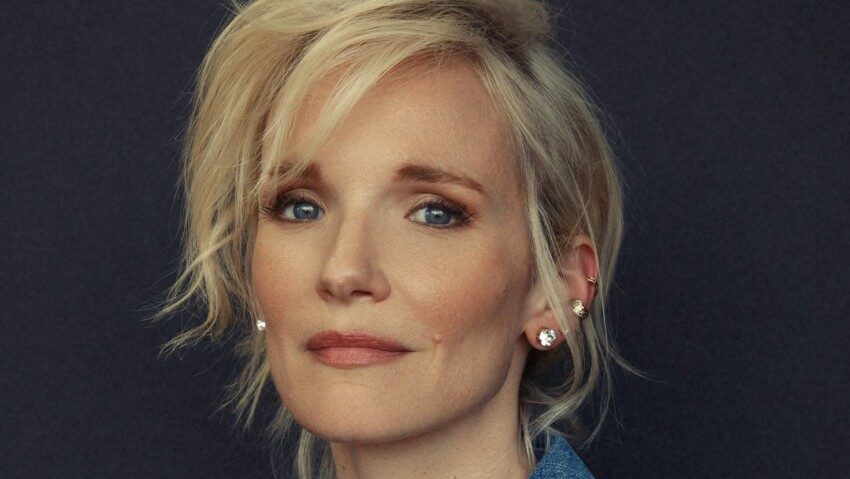
Marianne Farley: Oh Jesus! That’s a hard one! I’m just gonna come out with four words.
Annie St-Pierre: I’m okay with that.
Marriane Farley: You’re okay with four?
Annie St- Pierre: Yeah, I can give you four.
Marriane Farley: I would say that it’s a weird answer. But I’m going to say it anyway. “The cold is here!” That would be the words. I was going to do, “The cold is near”. It’s like its coming,
Annie St-Pierre: But it’s fantastic, you did the sentence.
Marriane Farley: I did!
Annie St- Pierre: I didn’t ask for a sentence. So, why wouldn’t you give me more?
Marriane Farley: Oh yeah! I was thinking, “I am gonna say a sentence or three words that have no connection.” Which is why we chose PRIMA as a title. FRIMA means a thick fog that turns into ice as it’s falling down. Which you know. That’s why we kept it in French. Because, in English it would be FROST. Which is too close to FROZEN, but that’s how I see this whole thing about women’s rights and abortion rights. Where we’re blinded by the fog, but it will eventually turn into ice. Which is what’s happening in my view when it comes to abortion rights.
Question No. 8 – What do you like the most about each other’s films?
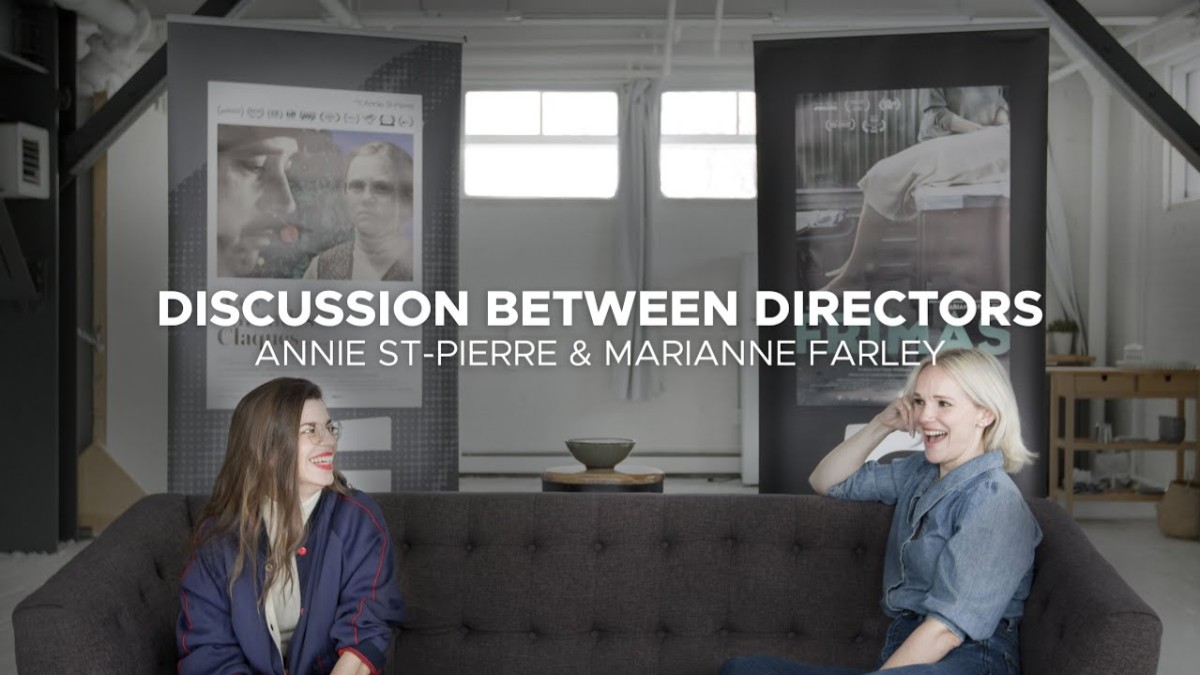
Annie St-Pierre: I would say there’s many things that I love in your film. I like the story, the context, they come out very bold. And it has to be like that, but the way the actors play it so delicate. It’s precise! They make us feel everything that we can see.
Marriane Farley: Oh because, I’m going to say the same thing about you. Again, I could say, visually the film is stunning! And just like the choices, you know the shots and that goes without saying. But there’s something so genuine in the acting. I know exactly what you were saying about the mother. The mother is not one-dimensional, she’s complex, she’s a good mom and she cares for him. But at the same time, she’s trying know create a separation between the two of them. She has a new man in her life, and all of that is really complex and beautiful.
There’s nothing cliche about any of “Les Grandes Claques” characters, which I find really beautiful. And you (Annie St-Pierre) have that intelligence, and intuition where you see things that most people don’t see. All that’s what you’re bringing to the screen, which I find incredibly beautiful.
Many thanks to h264. h264 is an integrated distribution studio supporting filmmakers and producers in the distribution of short films, feature films, aggregation, and discoverability. This one-of-a-kind studio has distributed several successful films including two recent Oscar®-nominated films. h264 wishes to support a handful number of films per year and develop innovative strategies tailored to each film, from screenplay to digital release.
Follow h264 on Social Media
Website
Vimeo
YouTube
Facebook
Instagram
Twitter
MORE STORIES FOR YOU
Richard Green Documentary, ‘I Know Catherine, The Log Lady’: Premiere in NYC, LA May 9th
Lynchian Doc I Know Catherine, The Log Lady Makes Hollywood Premiere 4/17, Rollout to Follow
In Camera by Naqqash Khlalid Launch on VOD April 29
Naqqash Khlalid’s Directs Nabhan Rizwan. In Camera stars an EE BAFTA Rising Star Award Nominee.
2025 Philip K. Dick Sci-Fi Film Festival Award Winners Announced
Vanessa Ly’s Memories of the Future Awarded Best PKD Feature
Dreaming of You by Jack McCafferty Debuts VOD & DVD for April Release
Freestyle Acquires “Dreaming of You” for April 15th Release
Hello Stranger by Paul Raschid set for London Games Festival & BIFFF
The film Is set for an April 10th Premiere at The Genesis Cinema in London (LGF) and BIFFF
Daydreamers Official Trailer by Timothy Linh Bui: Released by Dark Star Pictures
Daydreamers Vietnamese Vampire Thriller – May 2nd release









